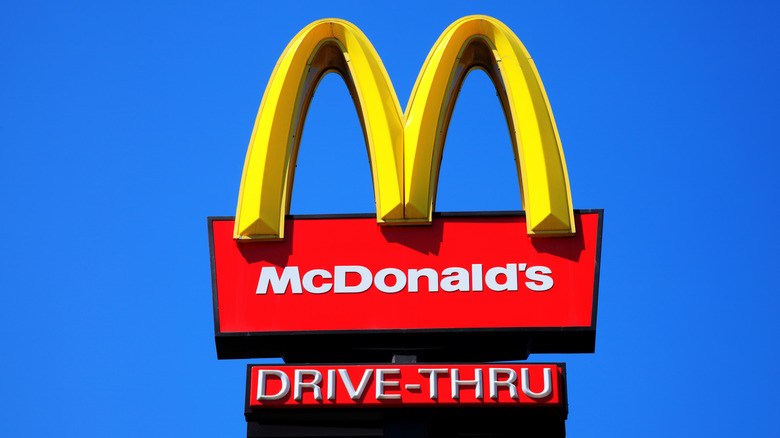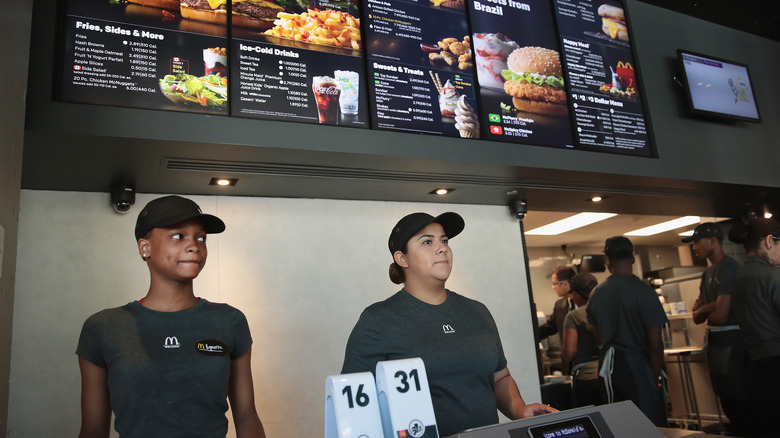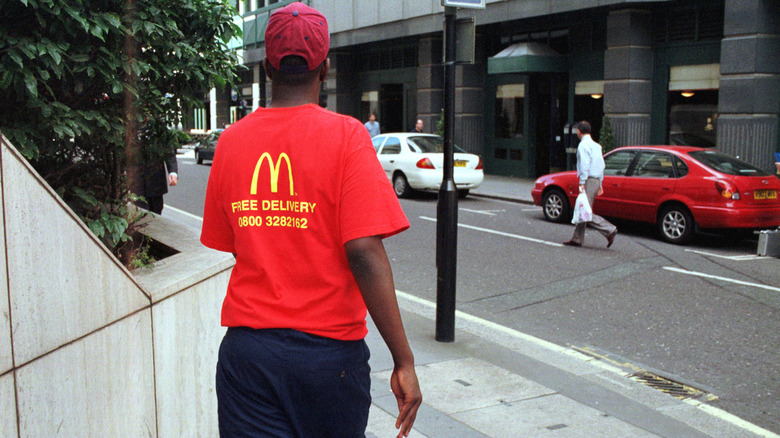The McDonald's 'No-Quit Policy' That Got The Internet In A Tizzy
The restaurant industry is rife with allegations of companies and managers trying to take advantage of their employees in myriad ways. From Papa John's $800,000 wage violation lawsuit to Starbucks allegedly firing a decades-long employee over union activity, it's an industry that certainly has an anti-labor reputation (even if many of the stories are unproven allegations). Even by those standards, though, one McDonald's franchise allegedly operated under a policy in 2023 that immediately got the internet's attention.
If you see this sign at a job you need a union pic.twitter.com/hPKq6MYiF0
— Read Let This Radicalize You (@JoshuaPHilll) July 11, 2023
The sign's header declares, "This is a no-quit restaurant." While this statement could be taken as some sort of motivational poster, the text below makes its meaning clear: "It is the policy of the restaurant that an employee cannot quit until he or she talks to the Restaurant Manager or the Area Supervisor."
But was this sign even real? Sure, it looks official, even appearing in both English and Spanish, but could it instead be the work of one very talented Photoshop editor? Well, it's not entirely clear. McDonald's does not appear to have publicly responded to the internet furor over the sign, and there does not seem to be any independent corroboration of its existence. There isn't even a specific report of which franchise the sign came from. There's no way to tell with any certainty whether this was ever a real policy — or if it was, whether it persists to this day.
No, a job cannot legally stop you from quitting
If the sign were real, it would certainly not be enforceable. The concept of a "you're not allowed to quit" directive is staggering on its face. There are some contracts that stipulate penalties and consequences if an employee leaves without notice, but these are infrequent, and there's no evidence that McDonald's general employment paperwork includes any similar clause. Even in those rare cases, the penalties of a breached contract would consist of financial damages and more obvious negatives like a poor work reference; you're not getting tossed in jail for quitting.
Meanwhile, there don't appear to be any allegations that this sign, if it were real, was a corporate directive. Surely, a company the size of McDonald's employs lawyers competent enough to know that an employer can't legally prevent employees from quitting. It's also hard to imagine McDonald's would want the public relations firestorm surrounding the legal question about whether such a policy violates the 13th Amendment to the U.S. Constitution's ban on involuntary servitude except as punishment for a crime.
At-will employment means you have the right to quit
The idea that a policy like the one depicted here could even be theoretically legal would seem to be based on a fundamental misunderstanding of what at-will employment actually means. Every U.S. state (and the District of Columbia) other than Montana operates under the general umbrella of at-will employment, which means an employer can terminate an employee at any time for any legal reason (illegal reasons include things like discrimination and retaliation, though the specifics vary from state to state). However, at-will employment also works in the other direction, granting employees rights just as it does employers.
This is the part of at-will employment that many people forget: It also stipulates that employees (outside of those under the aforementioned occasional and specific contracts) can quit a job at any time, without notice, with no negative legal consequences. Even requiring an employee to speak to a manager first is illegal since at-will means you can quit for any reason at any time. There would thus be no way for a restaurant to enforce a policy like this, and if they tried, they'd be begging for a lawsuit. That might not even be the point, though; if this sign was real, it could've simply been intended to act as an ultimately toothless deterrent against employees who wanted to leave.
McDonald's doesn't have a great labor track record
Regardless of whether it was real, the fact that people believed it speaks strongly to the reputation of not just the restaurant industry as a whole but McDonald's in particular. Like many of its contemporaries, McDonald's has been accused of wage theft, settling a class action lawsuit for $26 million in California in 2019. Meanwhile, McDonald's franchisees are constantly in trouble over teen work laws, with the U.S. Department of Labor finding locations in Kentucky, California, and Pennsylvania guilty of child labor violations in 2022 and 2023 alone (the Kentucky example found children as young as 10 working illegally). Incidents like these certainly paint a picture of a company that doesn't have the best track record regarding workplace practices, which helps explain why a "no quit" sign feels believable.
Incredibly, this isn't the only incident of a McDonald's franchise appearing to attempt to stop someone from quitting — and in the other case, there was video evidence. In a since-deleted TikTok from 2023, a user posted a video in which she told another employee (whether this was a manager is unclear) that she was putting in her two weeks' notice. The other employee replied, "You can't quit." While there's no way to tell whether the context involved a manager begging her not to quit rather than actively stopping her (as of a TikTok posted on April 7, 2024, the user appeared to still be employed at McDonald's), incidents like that only add fuel to the fire.



